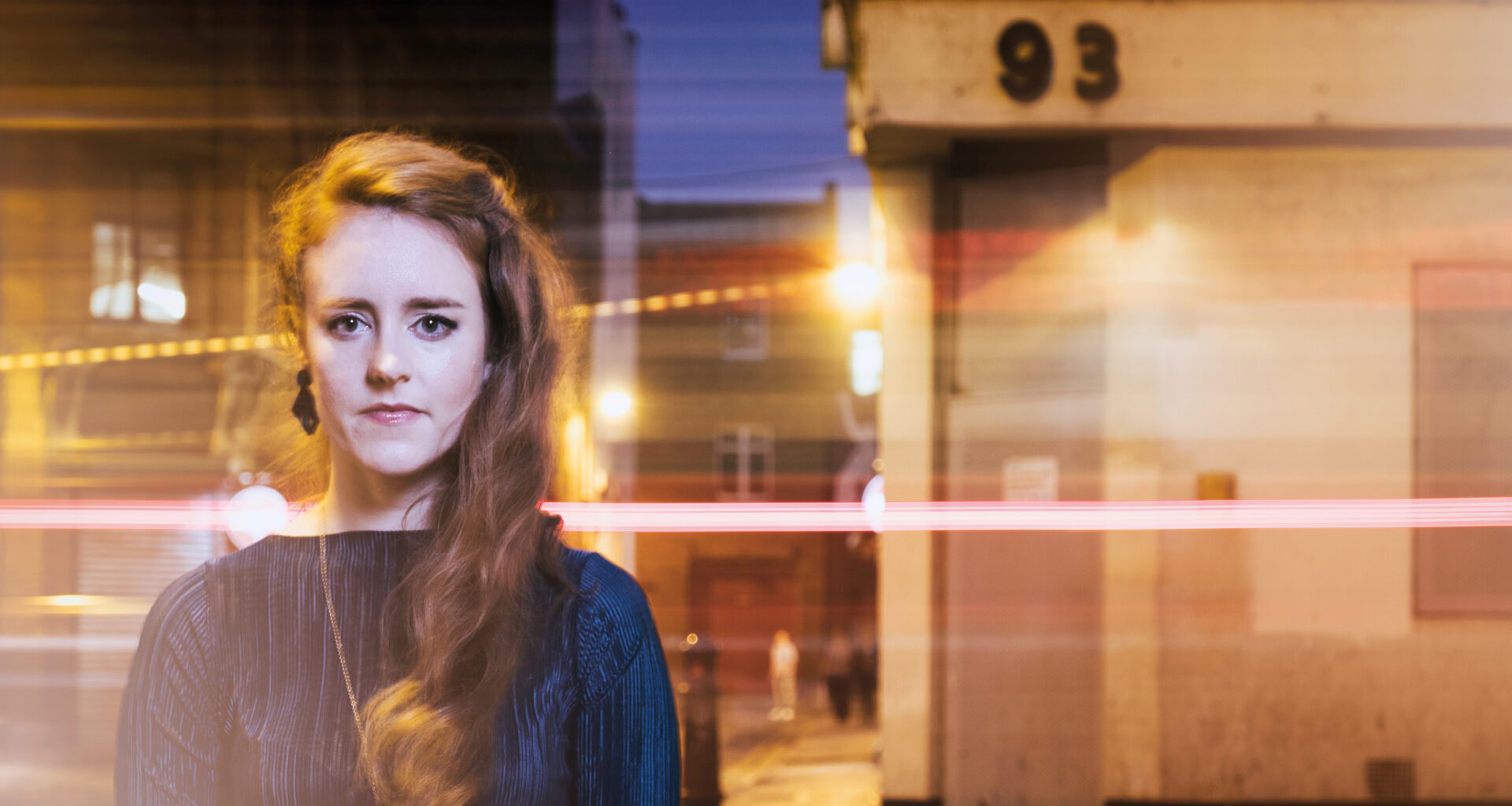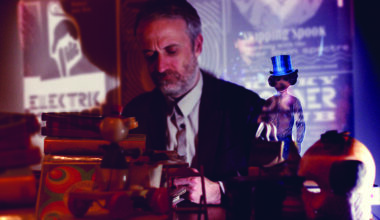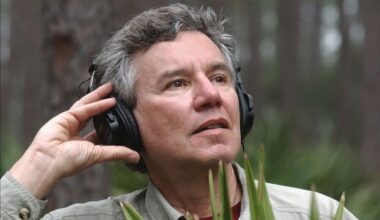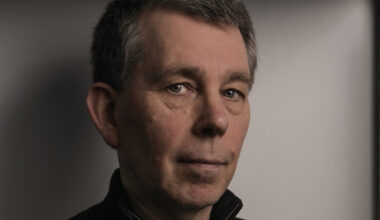Something of a best-kept secret, with her dazzling new album ‘Awake But Always Dreaming’ Hannah Peel is a star on the rise. We feel the increasing warmth of that limelight…
It beggars belief that Hannah Peel is still just 31 years old. How is that possible? This multi-faceted magnetic northerner already appears to have lived a dozen musical lifetimes. From acoustic balladeer to analogue synth devotee, from session player to solo artist to serial collaborator, in less then a decade Peel has played with John Foxx, East India Youth, Nitin Sawhney, The Unthanks, Wild Beasts, Orchestral Manoeuvres In The Dark and many more.
But even by her own busy standards, 2016 has been a hectic year for Peel. As well as releasing her sumptuous new solo album ‘Awake But Always Dreaming’, she joined her sporadic side project The Magnetic North for the second of their geographically-themed collaborations, ‘Prospect Of Skelmersdale’, launched her Mary Casio alias with a live symphony of sci-fi brasstronica and served as guest vocalist for Beyond The Wizards Sleeve, aka Erol Alkan and Richard Norris, on their psychedelic disco opus ‘The Soft Bounce’.
A natural networker and genre-mixer, Peel prefers her electronic music with a dash of random human chemistry. Like many of her collaborations, her involvement with Norris and Alkan grew out of personal connections, serendipity and an open-minded attitude. They did a remix for her, and she returned the favour with a guest vocal that expanded into six or seven album tracks.
“I like to create, I like collaborating, and I especially like the magic that can happen when you’re in a room with other people,” Peel explains. “The journey from my last solo album has involved a lot of discovery of what I like and don’t like, what music makes me tick, and discovering new production and engineering skills.
Working with John Foxx and Benge and even Beyond The Wizards Sleeve has really solidified that. It’s helped me find a voice.”
Recorded at Peel’s basement studio in Hoxton, east London, ‘Awake But Always Dreaming’ is a work of great beauty and maturity. Its polished dreamtronica layers are full of drones and arpeggios and delicate sound effects designed to invoke “the crackling of neurons in the brain”. The album was partly inspired by Italian author Italo Calvino’s experimental 1972 novel ‘Invisible Cities’, but also by Peel witnessing her late grandmother drift away into dementia.
“I suppose it is a concept album, but I didn’t intend it to be,” Peel nods. “The Calvino reference was there from the very beginning. I was obsessed with that book from when I first found it. In my heart I wanted to write a piece of music for every prose poem in it… and there are 55! Ha! I probably did about 25. Some of them have made various EPs and a couple stayed on the album, like ‘Octavia’ for example, and ‘Invisible City’ was directly inspired. Every single song on the record, I took from a line in the book.”
Peel only figured out the connection between Calvino’s book and her grandmother during the recording process when she discovered first-hand how music can help focus people with dementia, sharpening their senses, triggering vivid memories.
“My grandma lost a lot of daily functions and was in a care home,” she recalls. “But whenever you sang to her she smiled and sang along. It was a really amazing experience and it kind of tied everything together. I’d often wonder, ‘Where has she gone in her mind?. Is she living in this invisible city in her mind, is that where are all the memories are?’ So all of a sudden the whole piece just gelled together.”
Working on ‘Awake But Always Dreaming’ was a “long journey”, says Peel, channeling a kaleidoscopic mix of ingredients into rich, cinematic sound paintings. During the recording process, she pinned pictures to the studio walls.
“Every track has a visual element,” she explains. “It really helped to imagine where she had gone in her mind.”
Raised in Barnsley, Peel still talks with a pronounced South Yorkshire accent. But she was born in Craigavon, Northern Ireland’s answer to Milton Keynes, and she maintains strong links with her Irish roots.
“I feel like a weird hybrid of Barnsley and Irish,” she laughs. “I know I don’t sound it at all, but my whole family are Irish. I go back every holiday I can, I just got back two days ago. I spend a lot of time in Donegal, where it’s very rural and remote. It’s a nice opposite to London, which you need sometimes. What was wonderful about this album is I discovered a friend had a studio in Donegal, Attica Audio. It’s the most incredible place, it literally looks out over the mountains. So when I found that out we went back and finished the whole album there.”
The Peel family relocated to Barnsley when Hannah was seven after her father, a food factory manager, accepted a new job in England. Her mother worked as a teacher, but Peel says the whole family are “all musicians at heart”. Indeed, her grandfather was a choirboy who became an orchestral conductor. Her Mary Casio piece samples an old recording of him performing in Manchester Cathedral.
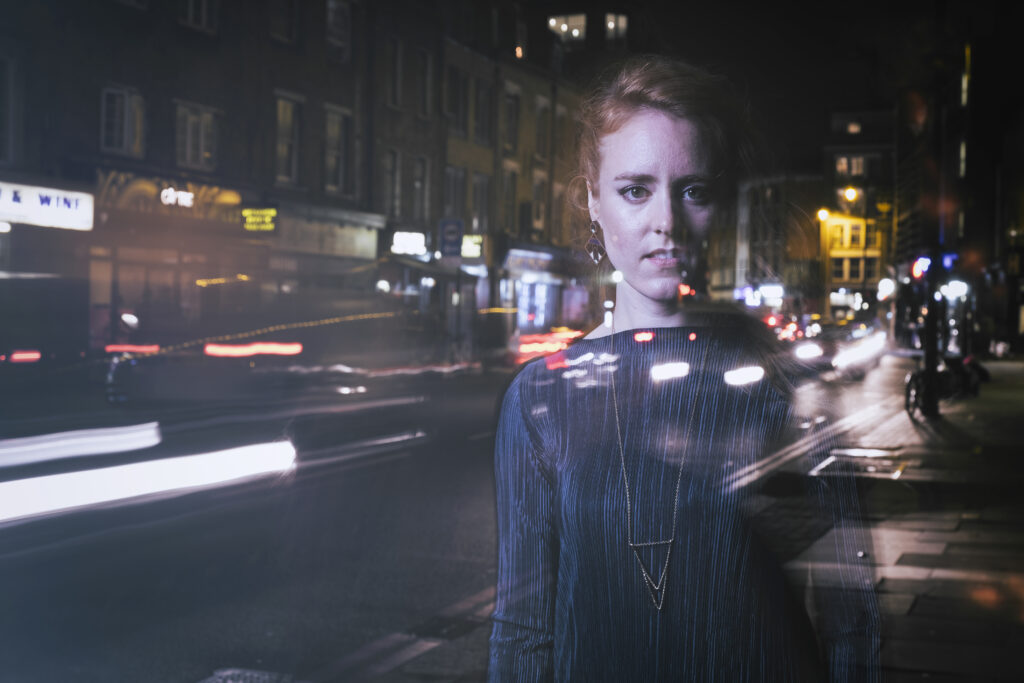
Peel’s own journey to recording fame has been a long and winding road. Earning a degree from the Liverpool Institute for Performing Arts, she first began composing for theatre and multimedia arts projects. Meanwhile her diverse musical talents earned her session work playing violin, trombone and organ for local indie bands and a handful of bigger artists, including chart-topper Sandi Thom and synthpop legends Orchestral Manoeuvres in the Dark.
Her debut solo release, the ‘Rebox’ EP in 2010, grew out of her theatre work. It featured a clutch of Eighties alt-pop classics reworked on an antique hand-cranked music box. From Soft Cell to New Order to Cocteau Twins, these twinkly artisan makeovers took hours of manual labour as Peel punched tiny holes in grid-pattern paper, patching up her mistakes with sellotape.
“I just thought it would be funny to do ‘Tainted Love’ because it was such a catchy riff,” Peel nods. “What works really well with the music box is if you have a really strong riff. You can take something very rigid, and it just has this wonderful effect, because you’re limited in notes and the amount of things you can do.”
Initially a sell-out limited vinyl run on the Lancashire-based indie label Static Caravan, ‘Rebox’ inspired Peel to continue her unorthodox music-box covers on later releases. She also recorded her debut solo album for the same label. ‘The Broken Wave’ was a largely acoustic art-pop opus spiced with a brace of traditional Irish songs and it earned positive reviews on release in 2011. Around the same time as her solo debut, Peel began working with two friends and labelmates, the Orcadian art-rocker Erland Cooper and former Verve/Blur guitarist Simon Tong. The trio called themselves The Magnetic North, releasing their debut album, ‘Orkney: Symphony of the Magnetic North’, in 2012.
Peel later came close to disowning her debut solo album and even asked her manager to remove it from iTunes. He talked her out of it, fortunately. In fact, it is a lovely debut. Just be careful not to use the F-word to describe it. For Peel, folk is a four-letter word.
“I’ve always avoided the term ‘folk’,” she says with a cringe. “Everyone said my first record was a folk album, and I hated it. For me, folk music has a massive sense of storytelling and melody… I’d hate to be categorised in any way. The folk thing, it paints a picture in one world and that world is not part of what I am.”
It was while recording ‘The Broken Wave’ that Peel first met John Foxx and his frequent musical collaborator, Ben “Benge” Edwards. Their fateful first encounter, she explains, was dictated by the location of the studio toilets. Which makes their musical partnership, almost literally, a marriage of convenience.
“I made my first album in Hoxton, at the same place that John Foxx was making the first Maths record,” she explains. “To get to the toilet he had to go through the studio I was using. He kept walking through, giving me a smile, so eventually we got talking. They were looking for a live band and knew I played violin and keyboards, but up until then I’d not done any work with synths.”
Peel’s collaboration with Foxx and Benge became what she calls her “master class degree” in analogue electronics. Her ears were well and truly opened and it’s safe to say she has embraced vintage synths with the zeal of a new convert.
Last year, Benge vacated his Hoxton studio, shipping his collection of classic synths to a new base in Cornwall. Peel has taken over part of the studio and begun filling it with a growing arsenal of Rolands and Korgs. To this day, she doesn’t use a laptop live, preferring the sensual buzz of old oscillators and modulators.
“It’s like they breathe by themselves,” Peel grins. “They have these wonderful nuances that you just can’t get if you do it on a computer. The pleasure for me comes from touching something real and physical, and making music that way rather than it just being this hyperreality in a cloud somewhere.”
Peel is in rehearsals to tour ‘Awake But Always Dreaming’. For the first time she is performing solo material with an extra musician on stage, the sometime Goldfrapp drummer Daisy Palmer.
“She is fantastic,” Peel says. “She can hit a lot of loops and samples and stuff, so it sounds like the record, which is more than I could have dreamed.”
As well as her solo album and tour, Peel is also engaged in her Mary Casio project, an experimental symphony that blends vintage electronics with a 33-piece brass band. Partly inspired by female analogue pioneers such as Daphne Oram and Delia Derbyshire, the fanciful back story to the music involves Peel’s musical alter ego, 86-year-old Mary, exploring deep space from her garden shed in Barnsley.
“I had this name in my head for a long time,” Peel explains. “Mary is my middle name, but also Casio just sounded like this crazy space lady that would play on her Casio keyboard. Then when I found out there is actually a star constellation called Cassiopeia, it just became clear she was going to go on a journey into space.”
The project was commissioned for a live brass band event in Manchester, where Peel premiered it back in May. Further dates are set to follow in Bristol, London and other cities, with an album likely some time next year. In a pleasingly retro touch, Peel composed some of the tracks using random suggestions taken from Brian Eno and Peter Schmidt’s famous Oblique Strategies cards, first created in 1975.
“My new album took me five years to do, Mary Casio took probably about four weeks,” Peel laughs. “With Oblique Strategies, I’d just choose one, lay them out and then do what they say. One of them said, ‘Do something you really don’t like’, so I used a synth I really don’t like. Actually it’s the best synth, a Korg Mono/Poly, and the reason it annoyed me so much was it just wasn’t working properly. But that was what the card told me to do, so I made a piece out of it.”
So far, most of Peel’s collaborators have been male. As Björk, Grimes and many others have noted, electronic music can be as sexist as any other scene. She explains she needs to be “diplomatic on a daily basis”, citing a couple of examples where less experienced men were given jobs for which she was much more suited.
“I look quite young, people think I’m 21 or 22,” Peel says. “I feel that’s been detrimental because people think you’re not as qualified as you are. But it’s also great because you’re so youthful looking, ha! I used it to my advantage, put it that way. Actually, working with the brass band for Mary Casio has been an experience, because in the band itself there are only two women out of 30-odd players, so obviously a female composer is a bit different for them.”
With a full schedule of live and studio work, Peel’s future looks to be as busy as her past. Further albums with John Foxx And The Maths and The Magnetic North are planned, and there’s some “very interesting” collaborations on the cards.
From Craigavon to Cassiopeia, from Liverpool to London, from Barnsley to infinity and beyond, Hannah Peel has already covered great distances. But this magnetic northerner’s musical journey has only just begun.
‘Awake But Always Dreaming’ is out on My Own Pleasure
